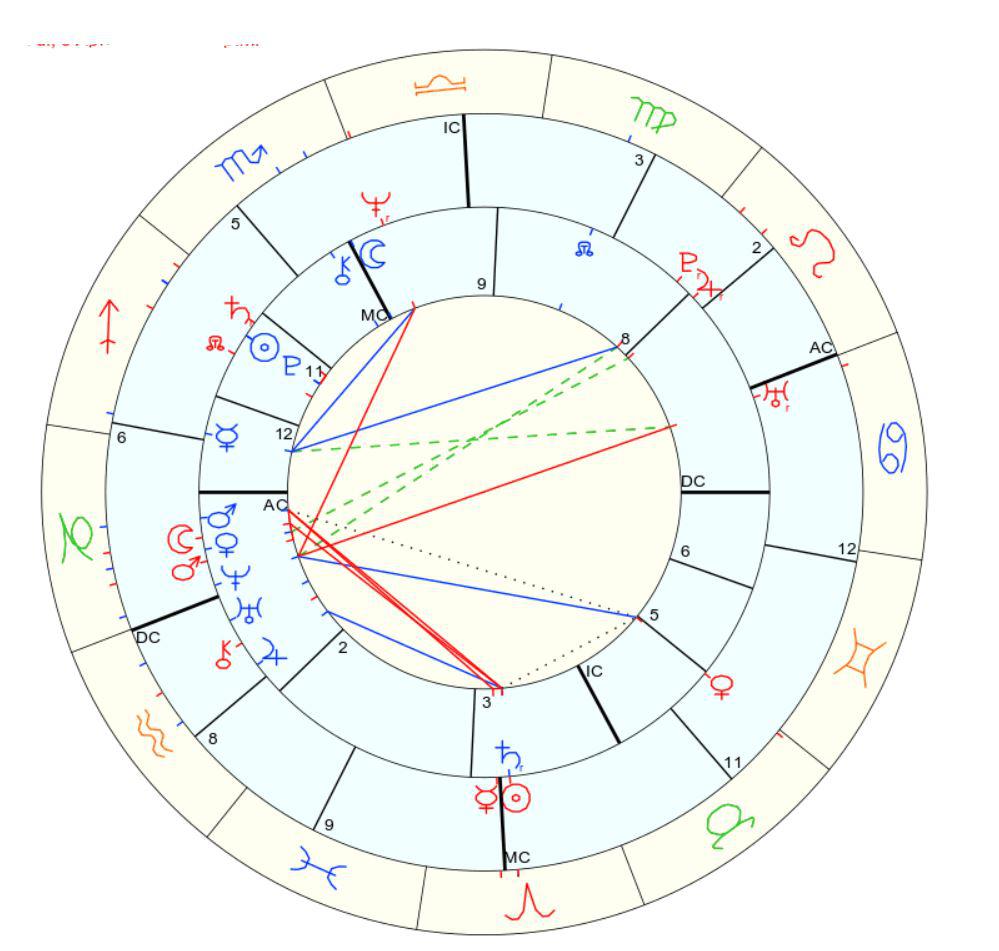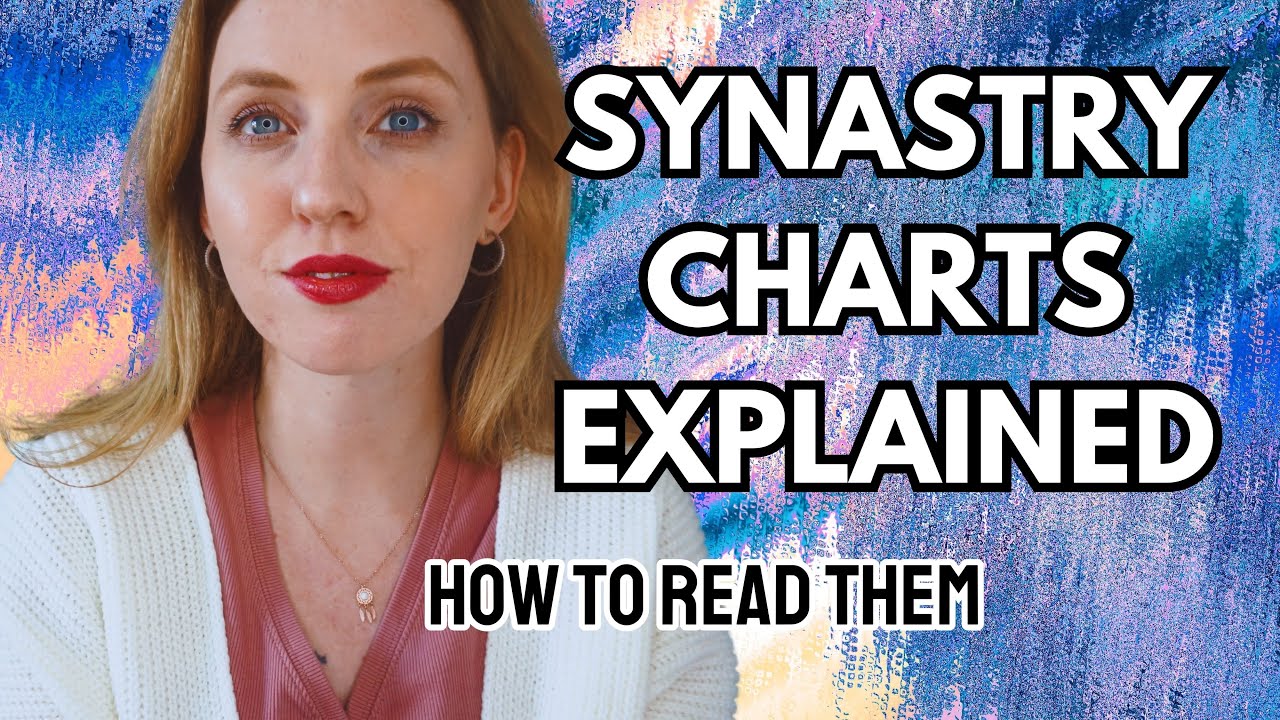Synastry Chart - Understanding The Astrological Compatibility Between Two Individuals
Synastry chart is an astrological tool used to gain insights into the dynamics of a relationship. It is also known as the relationship horoscope or compatibility chart. The synastry chart compares the birth charts of two individuals to reveal how their planetary placements interact and influence their relationship.
Author:Suleman ShahReviewer:Han JuApr 08, 2023133.8K Shares1.8M Views

Synastry chartis an astrological tool used to gain insights into the dynamics of a relationship. It is also known as the relationship horoscope or compatibility chart.
The synastry chart compares the birth charts of two individuals to reveal how their planetary placements interact and influence their relationship.
This tool can be used for romantic relationships, friendships, business partnerships, and any other type of close relationship.
The synastry chart can help individuals gain a deeper understanding of their relationship dynamics and identify areas of compatibility and potential challenges.
In this article, we will explore the concept of synastry chart, how it works, and how it can be used to interpret the compatibility between two individuals.
What Is A Synastry Chart?
A synastry chart is a powerful tool for understanding the dynamics of a relationship. It can offer valuable insights into the strengths and weaknesses of a partnership, as well as provide guidance on how to improve communication and deepen intimacy.
In a synastry chart, the positions of the planets in each person's natal chart are compared to reveal how they interact with each other. This analysis can identify areas of compatibility and areas of potential conflict.
For example, if one partner's Mars is in a challenging aspect to the other's Venus, it may indicate a tendency for power struggles or disagreements over values.
Understanding the significance of each planet and aspect in the synastry chart requires knowledge of astrology, but a skilled astrologer can interpret the chart in a way that is accessible and useful to both partners.
Ultimately, the goal of a synastry chart analysis is to foster greater understanding and empathy between partners, allowing them to work together to create a healthy and fulfilling relationship.
How Does A Synastry Chart Work?
A Synastry Chart is a tool used in astrology to determine the compatibility and potential areas of challenge between two individuals in a relationship. It works by comparing the positions of the planets and other celestial bodies in each person's natal chart and analyzing the aspects they make to each other.
The Synastry Chart takes into account the positions of the Sun, Moon, planets, and important points in each person's chart, such as the Ascendant, Descendant, Midheaven, and IC. The aspects formed between these points are then analyzed to gain insights into the dynamics of the relationship.
For example, if one person's Moon is conjunct the other person's Venus, this could indicate a strong emotional connection and potential for romance.
On the other hand, if one person's Saturn is square the other person's Venus, this could indicate challenges in expressing love and may require effort and compromise to overcome.
Ultimately, the Synastry Chart serves as a tool for self-awareness and understanding of the dynamics in a relationship, and can provide valuable insights and guidance for navigating challenges and enhancing harmony.
Interpreting A Synastry Chart
Interpreting a synastry chart involves analyzing the planetary placements and aspects between two individuals to gain insight into their relationship dynamics. Here are some key elements to consider when interpreting a synastry chart:
- Planetary placements- The planetary positions in the chart show where each person's strengths and weaknesses lie, as well as how they express themselves in various areas of life.
- Aspects - Aspects describe the interactions between the planets, such as conjunctions, oppositions, and trines. These show how the energies of each person blend or conflict with each other.
- Houses- Each planet in the synastry chart falls in a specific house, which relates to a particular area of life. These can give insights into the specific themes of the relationship, such as communication, family, or career.
- Dominant planets- The dominant planets in a synastry chart are the ones that have the most influence on the relationship. These can show where each person's strengths and weaknesses lie, as well as the challenges and opportunities they may face together.
Overall, a synastry chart can provide a deeper understanding of the relationship between two individuals and help identify areas where they may need to work on communication, compromise, or other issues.

Synastry Charts Explained: How To Read YOUR Relationship Compatibility | Hannah’s Elsewhere
Synastry Chart Compatibility
Synastry charts can be used to evaluate compatibility between two individuals, whether they are friends, family members, or romantic partners.
The chart can provide insights into the dynamics of the relationship and the strengths and weaknesses of the individuals involved.
When analyzing the synastry chart, astrologers look at the placement of the planets, the aspects they form with each other, and the houses they occupy.
This information can reveal how the energies of the two individuals interact with each other and where there may be areas of harmony or conflict.
For example, if one person's Venus (which represents love and relationships) is in the same sign as the other person's Mars (which represents passion and sexuality), there may be a strong attraction between the two.
Conversely, if one person's Saturn (which represents limitations and boundaries) is in a challenging aspect with the other person's Sun (which represents the core self), there may be issues with power struggles and a lack of understanding between the two.
Ultimately, the compatibility of a synastry chart depends on the individuals involved and their willingness to work through any challenges that may arise.
A synastry chart can provide valuable insights into the dynamics of a relationship, but it is up to the individuals to determine how they want to use this information in their interactions with each other.
Can Synastry Charts Predict The Success Of A Relationship?
Synastry Charts can provide insights into the dynamics of a relationship, but they cannot predict the success or failure of a relationship with certainty.
A Synastry Chart is a tool used to analyze the astrological aspects and placements between two individuals, and how they interact with each other.
It can reveal strengths, weaknesses, and potential areas of conflict in a relationship, but it is ultimately up to the individuals involved to determine the success of their relationship through their actions and choices.
Additionally, there are many other factors that can influence the success of a relationship, such as communication, trust, and compatibility beyond astrology.
People Also Ask
How Is A Synastry Chart Calculated?
A synastry chart is calculated by comparing the positions of the planets and other celestial bodies in two individual birth charts. The positions of the planets are measured at the exact time, date, and location of each person's birth.
These positions are then plotted on a circular chart, with one person's chart in the center and the other person's chart placed around the outside of the circle.
What Does A Synastry Chart Reveal About Relationships?
A synastry chart can reveal the strengths and weaknesses of a relationship, as well as the areas where each person complements or challenges the other. It can also provide insight into the overall compatibility and potential for growth in the relationship.
How Can A Synastry Chart Be Used In Relationship Counseling?
A synastry chart can be a valuable tool in relationship counseling, as it can help identify areas of conflict and opportunities for growth in the relationship.
By analyzing the chart, a counselor can work with the couple to develop strategies for improving communication, resolving conflicts, and building a stronger, more fulfilling relationship.
What Are Some Synastry Chart Aspects To Look For?
Some of the most important aspects to look for in a synastry chart include the conjunction (when two planets are in the same sign and degree), the opposition (when two planets are in opposite signs), and the trine (when two planets are 120 degrees apart).
These aspects can indicate areas of compatibility, while challenging aspects such as the square (when two planets are 90 degrees apart) can point to areas of conflict or tension.
Final Thoughts
Synastry charts can provide valuable insights into the compatibility of two individuals, but they are just one tool in the complex world of astrology.
To get the most out of a synastry chart, it is important to work with an experienced astrologer who can provide guidance and interpretation based on a deep understanding of the chart's many elements.
Whether you are exploring a new relationship or seeking to deepen an existing one, a synastry chart can offer valuable guidance and support on your journey.

Suleman Shah
Author
Suleman Shah is a researcher and freelance writer. As a researcher, he has worked with MNS University of Agriculture, Multan (Pakistan) and Texas A & M University (USA). He regularly writes science articles and blogs for science news website immersse.com and open access publishers OA Publishing London and Scientific Times. He loves to keep himself updated on scientific developments and convert these developments into everyday language to update the readers about the developments in the scientific era. His primary research focus is Plant sciences, and he contributed to this field by publishing his research in scientific journals and presenting his work at many Conferences.
Shah graduated from the University of Agriculture Faisalabad (Pakistan) and started his professional carrier with Jaffer Agro Services and later with the Agriculture Department of the Government of Pakistan. His research interest compelled and attracted him to proceed with his carrier in Plant sciences research. So, he started his Ph.D. in Soil Science at MNS University of Agriculture Multan (Pakistan). Later, he started working as a visiting scholar with Texas A&M University (USA).
Shah’s experience with big Open Excess publishers like Springers, Frontiers, MDPI, etc., testified to his belief in Open Access as a barrier-removing mechanism between researchers and the readers of their research. Shah believes that Open Access is revolutionizing the publication process and benefitting research in all fields.

Han Ju
Reviewer
Hello! I'm Han Ju, the heart behind World Wide Journals. My life is a unique tapestry woven from the threads of news, spirituality, and science, enriched by melodies from my guitar. Raised amidst tales of the ancient and the arcane, I developed a keen eye for the stories that truly matter. Through my work, I seek to bridge the seen with the unseen, marrying the rigor of science with the depth of spirituality.
Each article at World Wide Journals is a piece of this ongoing quest, blending analysis with personal reflection. Whether exploring quantum frontiers or strumming chords under the stars, my aim is to inspire and provoke thought, inviting you into a world where every discovery is a note in the grand symphony of existence.
Welcome aboard this journey of insight and exploration, where curiosity leads and music guides.
Latest Articles
Popular Articles